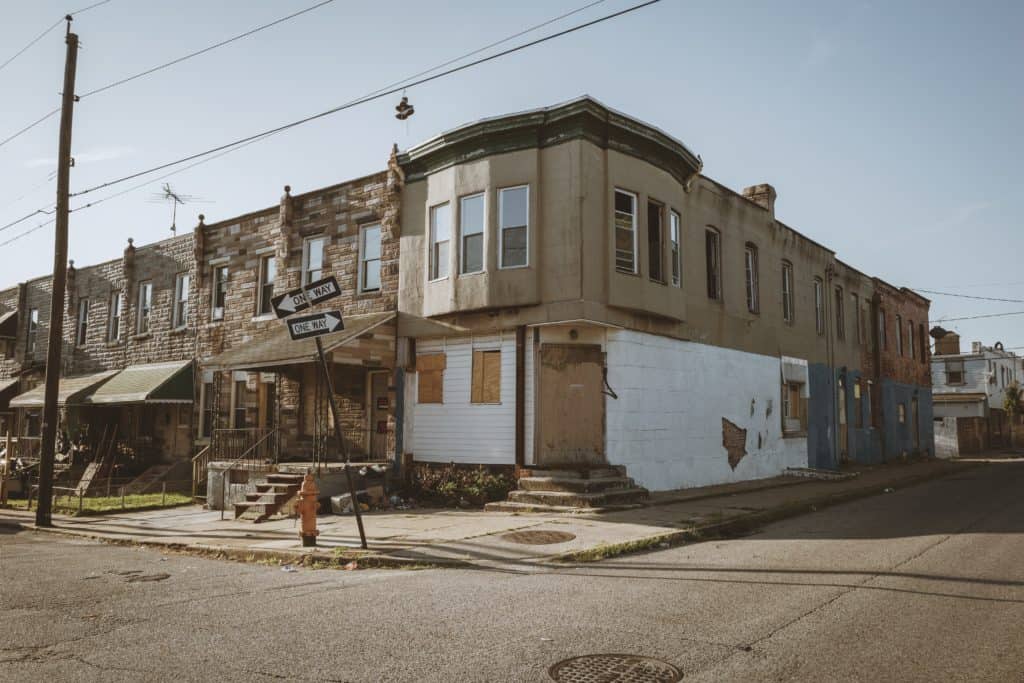COVID-19 continues to aggravate deeply embedded inequalities. We need bold policy solutions aimed at bridging the racial wealth divide now more than ever.
In Baltimore, like in the rest of the United States, COVID-19 exacerbates racial inequality and economic marginalization. The legacy of discrimination and the continued corruption and disenfranchisement take shape in the city’s biggest issues – homelessness, food insecurity, crime, poverty and lack of access to resources. COVID-19 magnifies these issues and shows that they cannot be fixed without systemic change.
The Baltimore Brothers, a nonprofit organization serving the city’s most vulnerable people, have been providing food and necessary resources to the communities who aren’t reached by local agencies or state government. After a devastating shooting on March 17, the Brothers fed the community for 3 days after watching the city fail to provide any kind of social aid.
“Nobody showed up,” Andrew Knox, a leader of Baltimore Brothers, said. “No CPS showed up, nobody responded but law enforcement. It became a criminal or police matter, and not a social aid matter…There is some aid happening in Baltimore, but some communities, who really need it, are not receiving aid. High-crime areas are not being served the same way.”
Knox’s comments speak to the systemic issues that low-income communities of color regularly face. Millions of Americans live just one paycheck away from financial disaster. Black and Latinx communities are particularly economically vulnerable thanks to the barriers that keep them from accumulating the wealth of their non-Hispanic White counterparts. We only have to look back 11 years to understand what the effect of the COVID-19 economic downturn will be for financially vulnerable communities.
The 2008 housing collapse and ensuing recession disproportionately affected Black and Latinx communities, both in its occurrence and in the recovery. In 2009, the unemployment rate for all Americans was 10%, but for African Americans, it exceeded 16%. Wealth among Black and Latinx communities severely dropped from 2005 to 2009, with a 53% and 66% decline in wealth respectively. Ten years later, Black communities have just again returned to their pre-recession median income, but high rates of unemployment coupled with declining wealth and low homeownership rates perpetuate financial precarity.
The coronavirus crisis will also not impact everyone evenly. Stark differences between work privileges have been revealed – 37% of Asian Americans and 30% of White people can work remotely, but only 20% of African Americans and 16% of Hispanic people have that ability. Black and Latinx people are more likely to work in lower-paid, consumer facing jobs, leaving them at a higher risk of contracting COVID-19.
Thanks to the systemic injustices of racial and economic inequality, pre-existing health conditions among African Americans, such as diabetes, heart disease and asthma, compound with COVID-19 to hit African Americans harder during this crisis. In Chicago, Black residents make up more than half of all COVID-19 cases and more than 70% of COVID-19 related deaths, but only account for 30% of the population.
Health concerns make up one side of the COVID-19 coin while economic decline constructs the other. Economic researchers at the University of California, Berkeley, predict that the economic effects of COVID-19 will lead us to something much deeper than the Great Recession. The Economic Policy Institute predicts a 15% unemployment rate by July 2020, and as the Black unemployment rate is usually double the White unemployment rate, this means that Black communities are looking at unemployment rates of at least 25%.
As COVID-19 continues to aggravate deeply embedded social and economic inequalities, we now, more than ever, need bold policy solutions aimed at bridging the racial wealth divide. The country must stop advancing trillion dollar packages that disproportionately benefit large businesses and stabilize industries that have done little to move past the racial inequality of old.
Our 2019 report, Ten Solutions to Bridge the Racial Wealth Divide, proposed bold bottom-up policy solutions to rebuild the economy after decades of regressive, trickle down economics. Universal public health care for all, full employment, increased affordable housing and a racial wealth audit on federal legislation are the types of investments the country must make to bridge the racial wealth divide. It will be a tragedy if the best the country can hope for coming out of COVID-19 is a return to the economics of inequality and social marginalization that historically has characterized the United States.
Dedrick Asante-Muhammad is NCRC’s Chief of Race, Wealth and Community.
Sally Sim is a NCRC Race, Wealth and Community intern.
Photo by Baron Cole on Unsplash



